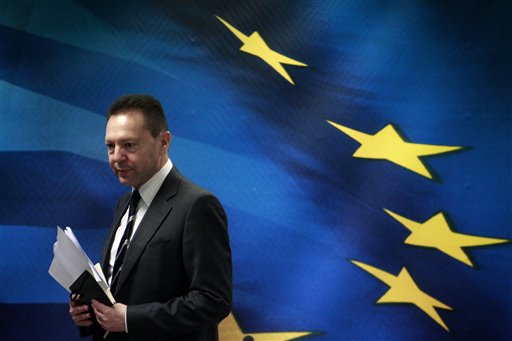Photo: pensionpulse.blogspot.com
Victoria Mindova
The main concern of the Greek government at present is how to attract investors to participate in the buyback of bonds issued earlier this year. This remains one of the most unclear parts of the deal with Greece's lenders to restore debt sustainability. The market value of Greek government bonds continues to grow and it is possible that it may exceed the price the government offers for their buyback.
"The success of the buyback of the debt is a patriotic duty," Greek Finance Minister Yainnis Stournaras  said at a press conference in Athens. He stressed that eurozone ministers have pledged to assist the country to reduce its debt by 20% if the Mediterraneans fulfil their obligations under the bailout agreement.
said at a press conference in Athens. He stressed that eurozone ministers have pledged to assist the country to reduce its debt by 20% if the Mediterraneans fulfil their obligations under the bailout agreement.
The head of the Public Debt Management Agency Stelios Papadopoulos insists that the offer of the Greek government for the buyback of bonds is very attractive to investors. "The average price of bonds which we currently offer for buyback was 25% of their nominal value, when they began to be traded in the secondary market for the first time in March this year. Their value dropped in the summer to an average of 14% of the nominal and now, it is about 28%. So, 35% is a very attractive offer for the investors who hold Greek debt," said Papadopoulos.
Officials insist that the debt buyback will be on a voluntary basis, but local economic analysts call the process "a voluntary participation of mandatory nature."
The agency managing the external debt will run the process, which is expected to begin early next week. Stournaras emphasizes that there are two conditions for Greece to receive the funds of the financial aid. The first one is that the national assemblies of eurozone countries should vote on the granting of the aid and the other one is for Greece to submit a report with the results of the buyback of bonds.
The debates about the success of the process reveal the distrust of society in the success of the buyback of securities. The process is perceived as a sacrifice that local investors have to make but it will not yield the expected results. Social security funds hold bonds with a nominal value of 5.5 billion euro. Although their market price is low, the buyback will further reduce their capital adequacy and it is questionable whether they should participate in the process.
"Those who will surely gain a greater profit from the buyback of Greek bonds are speculators," a Greek financial journalist told GRReporter. He explained that foreign investors and hedge funds have purchased Greek government bonds on the secondary market at very low levels compared to the nominal value during the election campaign this summer. The offer of 35 cents per euro of the Greek debt is a gold mine for this type of investors and most likely, they will take advantage of the opportunity.
"The hardships are just starting. I emphasized this before the Council of Ministers today. The months that are ahead of us will be very difficult because we will have to apply what we voted," concluded the Minister of Finance.